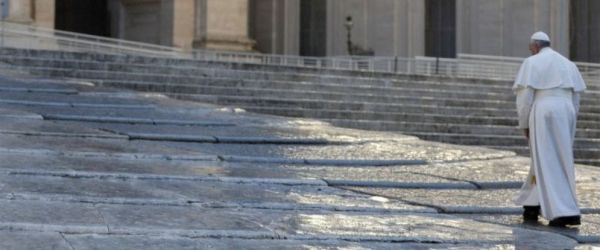Today’s Gospel episode (cf. Mk 12:38-44) concludes the series of Jesus’ teachings given in the Temple of Jerusalem and highlights two contrasting figures: the scribe and the widow. But why are they counterposed? The scribe represents important, wealthy, influential people; the other person — the widow — represents the least, the poor, the weak. In reality, Jesus’ resolute judgment of the scribes is not about the whole profession, but refers to those of them who flaunt their own social position, embellish themselves with the title of ‘rabbi’, that is, teacher, who love to be revered and take the best seats (cf. vv. 38-39).
What is worse is that their ostentation is, above all, of a religious nature, because they pray — Jesus says — and “for a pretense make long prayers” (v. 40), and use God in order to gain respect for themselves as the defenders of his law. This attitude of superiority and vanity causes them to have contempt for those who count for little or who find themselves in an unfavourable economic position, such as widows.
Jesus exposes this perverse mechanism: he denounces the oppression of the weak carried out misleadingly on the basis of religious motivations, declaring clearly that God is on the side of the least. And to really impress this lesson on the minds of the disciples he offers them a living example: a poor widow, whose social position was irrelevant because she had no husband who could defend her rights, and therefore she became easy prey to unscrupulous creditors, because these creditors hounded the weak so they would pay them. This woman, who goes to the temple treasury to put in just two coins — all that she had left — and makes her offering by seeking to pass by unobserved, almost as if ashamed. But, in this very humility, she performs an act laden with great religious and spiritual significance. That gesture full of sacrifice does not escape the gaze of Jesus, who instead sees shining in it the total self-giving to which he wishes to educate his disciples.
The lesson that Jesus offers us today helps us to recover what is essential in our life and fosters a practical and daily relationship with God. Brothers and sisters, the Lord’s scales are different from ours. He weighs people and their actions differently: God does not measure quantity but quality; he examines the heart; he looks at the purity of intentions. This means that our “giving” to God in prayer and to others in charity should always steer clear of ritualism and formalism, as well as of the logic of calculation, and must be an expression of gratuity, as Jesus did with us: he saved us freely. And we must do things as an expression of gratuity. This is why Jesus points to that poor and generous widow as a model of Christian life to be imitated. We do not know her name; however, we know her heart — we will find her in Heaven and go to greet her, certainly; and that is what counts before God. When we are tempted by the desire to stand out and give an accounting of our altruistic gestures, when we are too interested in the gaze of others and — might I say — when we act like ‘peacocks’, let us think of this woman. It will do us good: it will help us to divest ourselves of the superfluous in order to go to what truly counts, and to remain humble.
May the Virgin Mary, a poor woman who gave herself totally to God, sustain us in the aim of giving to the Lord and to brothers and sisters not something of ours but ourselves, in a humble and generous offering.
[Pope Francis, Angelus 11 November 2018]












